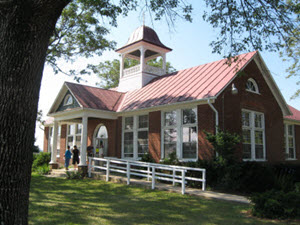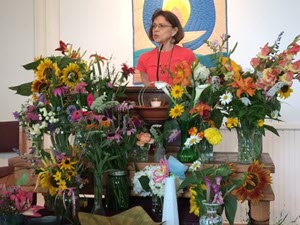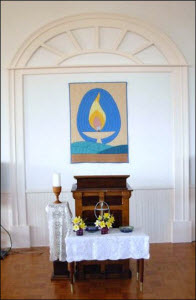
HUU Sermon Archives
Circles and Cycles
By JMU Campus Ministry Members
Kathleen McCraw
Stephanie (Steps) Feulner
Liz Ross
April 16, 2006
Introduction:
Once there was a village of Unitarian Universalist people who gathered together
on Easter morning. The sun was shining brightly, they were all dressed up in their
finest clothes, some had awakened to find Easter baskets all filled with eggs and
chocolate and jelly beans. Some had already eaten chocolates and jelly beans! They
gathered together in their big room for worship and listened to music and sang.
While they sat there, one young woman looked around and asked the elder:
Holly: "Why is this day different from all other days?"
Steps: "Well, because we have always done it this way."
Holly: "Yes, but -- WHY is this day different from ALL the others?"
Steps: "Because, because, because it is tradition! Yes, tradition!"
Holly: "Yes, but -- WHERE does the tradition come from?"
Steps- And everyone was quiet. No one was quite sure WHERE the tradition had come from and why they celebrated it in their own little village.
Liz: "The book may have the answer, the book is full of wise things."
Steps: "Yes, the book, the book, let's check the book."
So they all began to look through the book, there were copies of the book where everyone sat. Can you find your book? It's right there in the rack in front of most of you. Maybe the children can help. Can you take out the book and see if you can find the answer. There it is on that piece of blue paper. Go on, read it aloud.
THE LIVING TRADITION WE SHARE DRAWS FROM MANY SOURCES:
Direct experience of that transcending mystery and wonder, affirmed in all cultures, which moves us to a renewal of the spirit and an openness to the forces that create and uphold life;
Words and deeds of prophetic women and men which challenge us to confront powers and structures of evil with justice, compassion and the transforming power of love;
Wisdom from the world's religions which inspires us in our ethical and spiritual life;
Jewish and Christian teachings which call us to respond to God's love by loving our neighbors as ourselves;
Humanist teachings which counsel us to heed the guidance of reason and the results of science, and warn us against idolatries of the mind and spirit.
Spiritual teachings of earth-centered traditions which celebrate the sacred circle of life and instruct us to live in harmony with the rhythms of nature.
Grateful for the religious pluralism which enriches and ennobles our faith, we are inspired to deepen our understanding and expand our vision. As free congregations we enter into this covenant, promising to one another our mutual trust and support.
"Deepen our understanding and expand our vision. That must be it,"
Rev. Harris
"At Easter time Unitarian Universalists celebrate the many resurrections of this
season...We celebrate the ability of the human heart to overcome terrible personal
tragedy or handicap and affirm once more the ability to love or excel when many
others would have given up all hope."
We also come to celebrate our own spirits come to life again, after a long dark winter. We long to feel our own spirits begin to soar, to feel whole, to feel a part of that which is larger than ourselves, that which transcends us, that which is holy. It is time to once again feel that kind of personal resurrection of the spirit. It is time again to feel that kind of freedom of flight and connection at the same time. We have come through the time of darkness and are ready to embrace the light and the longer days of sun that spring has to offer.
The resurrection of the Earth is something we witness, participate in, and hopefully are blessed by when that resurrection is a benign and life-giving one. But the resurrections-in-life, as I've tried to describe here, require something of us. They require that we stay awake to the promise that in the face of some of the life denying events that are visited upon us, and in the face of some of the self-defeating ways we choose to live, we can choose to come back to life again. One of the many meanings I take from the crucifixion and resurrection myths is that sometimes certain things have to die in order for rebirth to take place. This legend contains the message that, yes, there are certain things we can die to: Old traps, old attachments to unrealized and unrealistic expectations of ourselves, old patterns of self-destructive behavior. There are certain things we can die to in order that we can re-awaked to renewed and life-affirming ways of being.
A resurrection is not a resurrection if we cannot wake up to its happening. Whatever may have imprisoned or entombed us in the past can still retain its power to do so if we don't walk past it and beyond it. The Easter promise is that we do not have to be defined by a 9 by 9 foot cage, or by any other kind of cage that may be keeping up from being and becoming the human beings we're meant to be and capable of being. Whatever the metaphor may be, that is the message of this season and all the seasons of our lives. I hope you take it to heart.
Easter: By Kathleen McCraw
When I was growing up, Easter, for me, was all about bunnies and eggs and candy. Having grown up in an entirely secular family, the true meaning of Easter was lost on me. It wasn't until one year, when my Southern Baptist grandmother kept making references to the crucifixion of Jesus and some subsequent rising from the dead, that I realized I'd been missing something about Easter. I was still a little confused--I was thinking zombies at that point--but my mother set me straight. Unfortunately, upon explaining the religious aspects of Easter, my mother recognized the absurdity of our celebrating it. From that year forward, there were no more candy-filled baskets and Easter-egg hunts. I never brought the subject up again, for fear she'd remember what Christmas was all about, too, and take that away as well.
In this past week, though, I've reconsidered Easter, and I intend to call my mother
and propose that we begin celebrating it again. At twenty-one, I've finally gotten
a pretty firm grasp on the reasons everyone should celebrate this holiday. Christian
canon, to make a long story very short, tells us that at roughly this time of year,
two thousand years ago, Jesus was crucified. Three days later, he was miraculously
resurrected, and he continued to live his life, carrying on the word of God to all
the people he met.
Probably many of you here believe, as I do, that Jesus was simply a human, and as
such, was probably not resurrected. Maybe some of you believe in these events wholeheartedly,
while others aren't sure. What, then, does Easter mean to us, as Unitarian Universalists,
if not the definite resurrection of Christ?
Easter is, first and foremost, a celebration of rebirths and new beginnings. I'm
sure that each and every one of us has experienced some form of pain or suffering
in the last few weeks, and today is the day for optimism in the face of that pain.
As the earth is slowly coming alive and green again after what seemed an interminable
winter, it's time all of us to embrace hope and optimism in the face of whatever
pain we might have. As the trees regain their leaves and the flowers slowly begin
to open their petals again, we should each figure out how to fit a newfound sense
of hope into our life, armed with the knowledge that however unbearably cold and
long winter may be, spring will always come to remind us that there is an end to
all suffering. Easter is a celebration of life over death and hope over pain, and
the fact that we celebrate it during the beginning days of spring is not an accident.
In addition, we as Unitarian Universalists should celebrate today the life of
someone who dedicated himself to spreading the very UU sentiments of tolerance,
dignity, love, and acceptance. Whether or not you believe that Jesus' life, death,
and resurrection were real or not is irrelevant; the fact remains that millions
of people around the world today continue to spread these virtues because of their
belief in this man's life, making the world a better place for it.
For us Unitarian Universalists, Easter is a celebration not of a literal, physical
rebirth, but of a spiritual one. As so many around the world today celebrate the
resurrection of a man whom they revere, let us take it one step further and universalize
this concept. Today is a day of new beginnings, resolutions of optimism and hope
in the face of all the hardships we've endured, of warmth and sun after a period
of cold, both literally and metaphorically. Today is the day to renew your confidence
in the return of spring each year. Today is the day to recognize the ways that each
of us can make life better, knowing that suffering is inevitable but conquerable.
This is why we, as Unitarian Universalists, should celebrate Easter.
Passover: By Liz Ross
Passover Sermon When I was younger, I was extremely proud of being part Jewish. I would hold my head extra high around the Jewish holidays and if anyone asked me what religious I was, I would say I was Jewish. When I was 5 I went to my cousins Bar Mitzvah and loved seeing all of my relatives and the big party at his house. From that point on I wanted a Bat Mitzvah and I would constantly beg my parents to send me to Hebrew school. But, my parents knew how much I hated regular school and they would tell me, “If you go to Hebrew school it means more homework, less play time, and you have to wear a dress.” Each time I heard those words I would cringe at the thought of more homework and wearing a dress. So, I decided against going. As I grew older I started identifying more with the UU faith, and I know consider myself a Jewish Unitarian, or Jew U. But each year particularly around the Hanukah and Passover my pride in my Jewish roots are rekindled a little bit.
Similar to the spirit of spring when nature awakens, comes to life, and the earth is reborn, Passover or “Pesach” is the birth date of the people of Israel. This holiday commemorates the event of God’s passing over the Jewish houses and killing all of the first born sons in Egypt. This led to the Pharaoh releasing the Jews form enslavement and our journey to freedom in Israel. Our birthday is when we became free and could finally return home. Every spring we celebrate our birth of freedom by reading the Haggadah which narrates our exodus from Egypt. It contains prayers, blessings, songs, and passages from the bible. It also dictates our actions and to commemorate our ancestors. For example, we did parsley in salt water to remember the tears that our enslaved ancestors shed. We eat Matzah-unleavened bread- because our ancestors left in such a hurry that the bread did not have time to rise. We at is with charoset which is made out of apples, dates, chipped nuts, and wine to symbolize the mortar used to make the bricks during the enslavement of the children of Israel. We eat maror, a bitter herb such as horseradish, to bring tears to our eyes. This is to show us that we cannot appreciate the sweetness of redemption unless we experience the bitterness of slavery. Once we have gone through the seder plate and experienced the bitterness of slavery that our ancestors went through, we then explain the meaning of this through questions.
Since Passover is the rebirth of Jews, it is a tradition for the youngest person at the Passover table to ask the four questions recited only at Passover. Each question asks what makes this night different from all of the other nights. The first two questions also inquire about why we only eat Matzah and bitter herbs where as on the other nights we can eat bread and all kinds of herbs. These questions and answers symbolize and remind us of the bitterness of slavery. The last two questions ask about why we dip our herbs twice and eat in a reclining position instead of eating in a sitting or reclining position. This symbolizes us of the glory of freedom. Once these questions are asked the oldest person at the table then responds to each question and explains the significance of this night.
By having the youngest person ask the oldest member we encourage the children to inquire about their past. We also teach them about the culture, traditions, and pass our heritage on to the next generation. When they grow up they can teach their children about their heritage. Passover allows us to celebrate the birth of freedom but also to keep their traditions alive by teaching the younger generations each year about our past and our ability to overcome oppression.
Passover is also about coming together as a community and celebrating. Our exodus from Egypt was the first shared Jewish experience as a community. We are supposed to open our arms and allow people to come into our homes to celebrate, because you cannot celebrate Pesach alone. The Matzah is also supposed to remind us that poverty still exists, and it is close to us. So we are supposed to let all who are in want to come and celebrate with us. In every Passover Seder I have never been alone. Whether it was with my cousins or neighbors my family has always been with loved ones. Since coming to JMU I can’t really go home to celebrate Passover, so I celebrate with Hillel-the Jewish community on campus. This year also marks the third year that Hillel and the Catholic Campus Ministry have come together to celebrate Passover because it was believed that Passover was the last supper. To me this symbolizes the true meaning of opening our hearts and community to share our traditions and beliefs with others. It also fits the stereotype that Jewish mothers make sure no one leaves without a good meal.
For me spring is a time when families and friends all come to together and celebrate the rebirth of traditions and the earth. Passover marks a time when we celebrate our freedom by remembering what we went through. It’s also a way for us to keep our culture alive by teaching it to the younger generations, thus giving birth to our beliefs each year. Every year I feel a sense of pride about who I am and where I came from. Knowing that my ancestors overcame oppression helps me get through the rest of the year-especially finals week. It also helps me remember to keep my arms and heart open to those who want to join us. Whether we are Jews, Catholics, pagans, or Muslims we are all human and are part of one community. So we should keep our arms open and be willing to share who we are with others.
Ostara: By Holly (still to come)
Ending: By Steps- "You see children, our living tradition calls on us to draw from many sources, to help us in the free and responsible search for truth and meaning which we affirm and promote. We do not imitate what others do, but there are certain times in our lives, when our spirits call us to take action or answer. We do not always understand our spirits calling. We learn from others who have come before us, to help us in creating rituals for ourselves alone, or in celebration with one another in our faith community. It is like we have been learning, no matter who we are, no matter what we do, we are all connected. We are interconnected to all who have come before us and all who will come after us. We learn from others, we celebrate ourselves and others and we work to create harmony as we take this journey together. In celebration of the new life that is awaking at this season, We all are connected, one family. Each to the other, people, animals and trees, As soon as we notice, how perfect it will be Living together, one family. Living together, in harmony.
Return to Sermon Archives
For the latest sermons and events at HUU, visit our Community Cafe.
Inclement
Weather Policy
Worship
Service Materials


UUs on YouTube
Our denomination has an official presence on YouTube! The Unitarian Universalist Association's YouTube site includes several videos and lots of interesting commentary.
Harrisonburg Unitarian Universalists 4101 Rawley Pike | Harrisonburg,
VA 22801
Mailing Address: | PO Box 96 | Harrisonburg, VA 22803
| (540) 867-0073 | Webmaster
HUU is a member of the Southern
Region of the Unitarian Universalist
Association
Privacy Policy &
Disclaimer
Site Design & Maintainence : Expression
Web Tutorials & Templates


